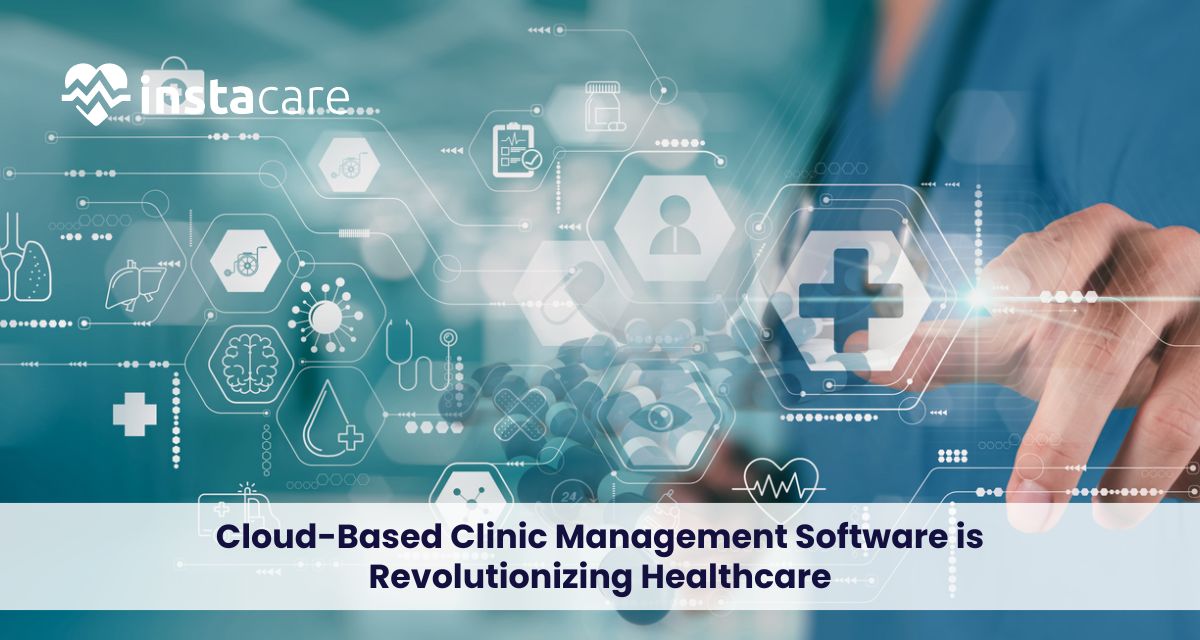Last updated on Wednesday, 25, September, 2024
Table of Contents
How is Cloud-Based Clinic Management Software is Revolutionizing Healthcare?
The healthcare sector has witnessed a transformation in recent years, especially due to technology. Among such innovations is the clinic management software implemented through the cloud game-changer. Overall, by leveraging cloud technology, healthcare providers can refine business processes, improve patient care, and increase efficiency. This blog post addresses the methods through which cloud-based clinic management software is changing healthcare, its benefits, and the future of the technology in medical practice.
Understanding Cloud-Based Clinic Management Software
Cloud-based clinic management software is a digital solution that enables healthcare providers to manage various administrative chores and patient information from a central, web-accessed platform. It’s not at all similar to the traditional software that could only work on an on-premises basis with maintenance. These systems are housed on secured servers that enable real-time updating as well as remote access.
Important Features of Cloud-Based CMS
- Patient Scheduling: Appointments can be scheduled easily, rescheduled, or even canceled in advance using cloud-based systems which avoid no shows, optimizing the clinician’s workflow.
- Electronic Health Records: The electronic record provides aggregated information on patient records like medical history, treatment plans, and medications to avoid delays in access of crucial information.
- Billing and Invoicing: Automated billing processes help in smooth financial transactions; it becomes easy to raise invoices, collect payments, and deal with insurance cases.
- Telehealth Integration: Most cloud-based CMS systems have telehealth functionalities. Which means that providers can virtually consult and are very important to healthcare providers and patients in the last couple of years.
Benefits of Cloud-Based Clinic Management Software
1-Improved Accessibility
Access is one of the most beneficial advantages of a cloud-based CMS. Patient data and administrative tools are available anytime, anywhere with an Internet connection on any device. This allows for the following:
Remote Work: Health care professionals can work from home and other locations, remotely, to improve work-life balance and continued delivery of health care services.
Mobile Accessibility: The health care professional will be able to access the patient’s history or update information from a mobile device on the move, thus leading to quicker decision-making and better patient care.
2-Better Collaboration
Cloud computing systems ensure that members of the health care team are collaborating better with each other. Many users can access and update patient information in real-time; thus, redundant data entry is avoided, and communication among departments improves. This collaborative approach leads to:
- Care Coordinated by Others: Collaboration among different specialists has the ability to be done with much ease, which essentially means a lot in the treatment process.
- Interdisciplinary Communication: Teams can discuss cases much more efficiently and will have better outcomes with the patient.
3-Cost Efficiences
Saving big money on the expenses: Taking the clinic management software through the cloud saves big for health organizations when considering the expenses. With traditional systems, one has to incur high expenditure on hardware and installation costs, in addition to maintenance costs. With cloud solutions, the services can be deployed based on a subscription system, thereby allowing for:
- A lower initial investment: the providers can start with their minimal upfront expenses, and this makes it friendly to small practices adopting the technology.
- Lower IT Costs: Upgrades and maintenance are handled by the cloud service providers hence the clinic will save on employing skilled IT staff and other support.
4-Enhanced Data Security
In health sectors, security of data is always of great importance since any information in relation to patients are secrets. The CMS solutions based on cloud usually include robust security features such as:
- Data Encryption: The patient’s data will be encrypted during both transit and storage to minimize unauthorized access.
- Regular Backups: Automated backups will support saving the data in case a system crashes or in case of cyber-attacks.
- Compliance with Regulations: Many providers of the cloud hold the compliance as per HIPAA, which helps you ensure patient records and other health data are handled safely.
5-Streamlined Workflow
Cloud-based clinic management software automates the majority of administrative tasks, thus managing workflows more efficiently. Features, including appointment reminders and automated billing, enhance workflow for staff and reduce the administrative burden that consequently can enable more time to be spent with patients. Some of the benefits include:
- Higher Productivity: With routine tasks automated, staff dedicate more time to interacting with the patient and providing care.
- Lower Errors: The chances of a human making a mistake in billing and data entry are reduced by automation.
Role of Telehealth
The rise of telehealth has been perhaps the most impactful trend in healthcare. It really came to a head during the COVID-19 pandemic. Cloud-based clinic management software typically has telehealth capabilities, allowing providers to see patients remotely. Some benefits include the following:
Challenges and Considerations
Even though cloud-based clinic management software has several benefits, some challenges and considerations should be regarded as essential in its implementation and usage:
1-Implementation and Training
Another change required to transition into a cloud-based system may include adjustments in workflow and processes. Staff training and proper support are essential for implementing this transition process. Providers must have considerable blocks of time and resources set aside to train and reduce resistance to change.
2-Internet Connectivity
Cloud-based systems require reliable connectivity in terms of the internet. Poor connectivity in areas might be an underlying factor that affects the access of the system to the clinic, which will eventually impact the patient care. Clinics must assess their internet infrastructure before moving to such a system.
3-Data Privacy Issues
Cloud technology has its weaknesses, and that is data privacy. Cloud service providers and healthcare providers must ensure that the said provider has complied with the regulatory requirements and ensures the protection of patient information.
The Future of Cloud-Based Clinic Management Software
Cloud-based clinic management software promises a bright future. As technology evolves, we see the following aspects:
Interoperability
Coordination of care requires effective communication and easy data exchangeability between various healthcare systems. Future cloud-based CMS solutions will probably highlight interoperability as the core focus of sharing patient information across multiple platforms and systems.
Patient Engagement Tools
The system also goes in line with new directions in health care toward a more patient-centered type of care. It is, therefore, likely to include more features for patient engagement such as mobile applications and portals for patients. These will enable patients to become more involved in their healthcare and thus achieve improved outcomes and general satisfaction.
Improved Security
With the advancement of cyber threats, it becomes evident that cloud-based CMS providers are going to give importance to security more than ever. Some measures that it will hold include regular security audits, advanced encryption techniques, and rather robust user authentication processes all targeted at safeguarding the patient’s data.
Conclusion
Cloud-based clinic management software revolutionizes the healthcare landscape as it brings forward solutions to enhance accessibility, improve collaboration, and streamline workflows. Integration of telehealth, AI, and other patient engagement tools will definitely revolutionize the practice of healthcare delivery due to advancing technology. Despite its difficult times, the advantages of cloud-based CMS definitely outweigh the disadvantages, marking it part of the modern healthcare landscape. Healthcare providers can improve patient outcomes and create an efficient and effective healthcare system if they embrace such a technology.
FAQs
1-Which kind of clinics can benefit from this cloud-based clinic management software?
Cloud-based clinic management software will serve a broad range of health care providers, including primary care clinics, specialty practices, dental offices, and mental health facilities. Any clinic wanting to streamline their operations, improve patient care, and manage data will be in a position to realize value from these systems.
2-Is cloud-based clinic management software secure?
Yes, for instance, a best-in-class cloud-based clinic management software company utilizes robust security practices, data encryption, scheduled back-ups, and onboarding in such a manner that is in compliance with healthcare regulations like HIPAA. But health care providers must research before they take home any cloud-based clinic management software.
3-How long does it take to deploy cloud-based clinic management software?
The timeline of the implementation depends on factors such as the size of the clinic, the complexity of operations, and the level of customization. However, usually, it ranges between several weeks to a few months, considering training staff and data migration



